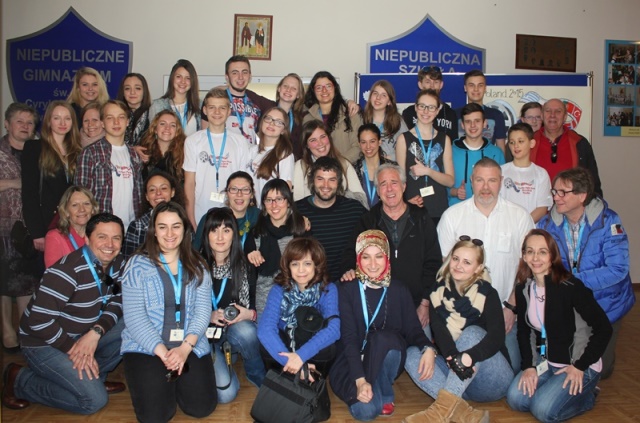
Stowarzyszenie Bractwo Prawosławne św. św. Cyryla i Metodego
ul. Waryńskiego 30, 15-461 Białystok
e-mail: bractwocim@cerkiew.pl
tel. +48698985777
NIP 966 07 87 821
COMENIUS MOBILITY REPORT
Type of visit: 8th mobility in Poland (workshop and students exchange)
Period: 16th of March – 20th of March 2015
Place: Białystok, Poland
Participats: Turkey (2 teachers), Norway (2 teachers and 2 students), Italy (1 teacher), France (3 teachers and 5 students), Portugal (3 teachers and 2 students), Spain (2 teachers), Romania (2 teachers)
Host school: Zespół Szkół Niepublicznych św. św. Cyryla i Metodego / Stowarzyszenie Bractwo Prawosławne św. św. Cyryla i Metodego
The eighth mobility in the Comenius Multilateral school project entitled “European Digital Stories” took place in Białystok, Poland. From 16th to 20th March, Zespół Szkół Niepublicznych św. św. Cyryla i Metodego/Stowarzyszenie Bractwo Prawosławne św. św. Cyryla i Metodego hosted participating schools from 7 countries. The Greek partner didn’t join this mobility. The main aims of this mobility were to common work and publish first e-bulletin, which contains students’ memories and opinion about the project after 7th mobilities and to see multicultural and multireligious region of Poland.
Objectives mobilities corresponded to a part of the project objectives being met fully.
Objectives of mobility:
Teachers:
- to see the Polish teaching environment;
- to discover important elements of Polish history, identity, traditions and culture;
- to create an intercultural and interreligious perspective of folklore traditions and customs;
- to discuss content of e-bulletin and ways of dissemination the project ideas;
- to prepare next project for Erasmus+ programme;
- to arrange the nineth project mobility (France).
Students:
- to collect impression for previous mobilities in order to create e-bulletin;
- to take part on different social activities together with the other involved in the project;
- to give students the opportunity to develop international team skills;
- to develop students’ creativity, increase competition and team spirit;
- to discover important elements of Polish history, identity and culture;
- to increase students’ IT and publishing knowledge and skills.
Daily activities:
17.03.2015
Activity 1: Reception at school
Activity 2: Integration and team spirit develop activities
Activity 3: Discussion on e-bulletin content and ways of dissemination project ideas (teachers)
Activity 4: Assignment to the groups and distribution of tasks (students)
Activity 5: A preliminary selection of the content of the e-bulletin (students)
Activity 6: Cultural visit: Kruszyniany – multicultural and Polish history lesson
Activity 7: Cultural visit: Supraśl – a few words about orthodox Christianity and history of printing
The first day started with the reception at Zespół Szkół Niepublicznych św. św. Cyryla i Metodego, the host school. The Polish students prepared a special programme for the international team presetting language and artistic talents. Afterward teachers and students visited classes and lessons in hosted school.
In the afternoon, the international team went to Kruszyniany to see Tatarian community and sightseeing the oldest polish mosque. It was a good lesson for Polish history and multicultural peaceful coexistence of different cultures and religious in one region. In Supraśl, teachers and students visited modern Museum of Icons and took part in workshop in Museum of Printing.
18.03.2015
Activity 1: Erasmus+ - introduction and working on “We-volunteers” project (teachers)
Activity 2: Graphics and text redaction (students)
Activity 3: E-bulletin composition (students)
Activity 4: Cultural visit: Białowieża – “green lungs” of Europe
Activity 5: Cultural visit: Siolo Budy – history and tradition of Podlasie region
On the second day students ended work on e-bulletin and familiarized publishing rules. Teachers discussed the next programme Erasmus+. It is the result of the mobility in Portugal, where partners expressed their interest in continuing the cooperation. Future project aims at familiarizing the students with the idea of volunteering and promote such activities among teenagers (12-20 years old).
In the afternoon all the delegations took part in a trip to Bialowieza, where they learned about the history and the tradition of all the nationalities and ethnic groups living in the area.
19.03.2015
Activity 1: Discussion about the next mobility in France (teachers)
Activity 2: Mobility evaluation (students)
Activity 3: Mobility evaluation and mobility rapport (teachers)
Activity 4: Cultural visit: Białystok – capitol of Podlasie region
The last day of the mobility started with the discussion on the next meeting in France. At that time the students were summing up their activities. They also talked about the positive outcome of their work and what they would change. Next, the students participated in team games in order to socialize and work in groups. During that time all the teachers summed up the mobility in Poland. The results of work of students – the printed version of e-bulletin were distributed for citizens of Białystok on the main square. The final day was an inspiration for future digital stories, mobility evaluation and report.
Conclusion: The mobility in Poland enhanced students’ chances on exploring European identity through all the activities and workshops that they participated in. Furthermore, they have learned about various cultures, religions and nationalities inhabiting Podlasie region. Throughout the mobility all the students could work in groups on the tasks that challenged their creativity and team spirit.
Working on the e-bulletin helped students to remind the history of the project and to ponder over which values they have learned. It is also a conclusion of the annual work to realize that the Comenius Programme offers both teachers and students not only the possibility of increasing interpersonal, professional and social skills, but also it increases the understanding the idea of being a citizen of Europe, your own county and your own region.
The Comenius Project Coordinator in Poland
Piotr Makal